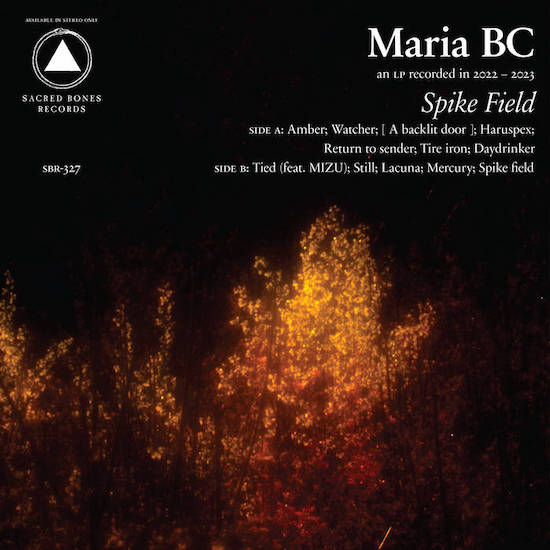A “spike field” is literally – as the name suggests – a field of spikes, serving as a marker to show that nuclear waste is buried there. It is a warning devised to speak the visual language of danger to anyone, or anything, that comes across them in 10,000 years not to use the land. A kind of universal deterrent that is able to signify beyond local, contemporary or perhaps even terrestrial cultural knowledge. Having a cursory look through Google Images, I’m pretty sure if I were on Earth in 10,000 years time, I would probably avoid spike fields just on a hunch.
So when I first found out this was the title of Maria BC’s latest album, I assumed (wrongly), that the album would be absolutely hostile to the listener at every point. According to their own statement, Spike Field serves as a move to both “kill and honor the past”. They claim that: “[they] wanted to erase the memories of anyone who knew [them] more than a year ago. It’s the effect of shame”. While this might be their mission, it’s actually interesting to see how – beyond the initial warning signals of its title – the album feels quite delicate.
Ghosts of their past echo throughout their songwriting. As a first release for Sacred Bones, Spike Field doesn’t deviate too much from their previous 2022 album Hyaline in terms of songwriting. Characterised by slow, very deliberate guitar arpeggiations, Maria BC’s musical signature hasn’t been altered beyond recognition. Voice, guitar and synths are more crystalline on this new album however – and are in greater focus. The production seems to serve the songs more too, as prominent chord changes are accompanied with rich, gentle synth pads.
Despite the minimal bed that it sits on, Spike Field seems to offer up different layers each time you listen to it. All other instrumentation around their guitar feels papery thin, as if not to cloud the melody too much. Maria BC’s voice is so whispery that it sounds like someone who is trying not to disturb an ancient place. It’s because of this that Spike Field isn’t particularly immediate, but is the kind of album that sits in your mind: you come back to it and it surprises you in a new way. I experienced this most of all with ‘[ A backlit door ]’. Layers of grainy synths – serving as a bridge to the new track ‘Haruspex’ – tease at a more majestic and and even angry sound, but they never take us that far.
‘Haruspex’ is the most standout track on the album – because it’s at this point that Maria BC’s guitar eventually breaks down beautifully (around the four minute mark), creating the kind of melancholy serenity that you find on ‘Pendulum Man’ by Bark Psychosis. It is Maria BC at their most minimal, and it’s here that they demonstrate a really keen sense for mood. I find myself coming back to this part, as it’s so stunningly arranged. ‘Lacuna’ has a similarly inspired palette of sounds, which to me sound like a granulised Steinway piano and vocals, which echo unnaturally throughout the piece.
I like when Maria BC plays around with sounds and textures rather than their more conventional approaches to guitar. They sound freer, seeming to represent something more like letting go. But for those who are a bit stronger than me, ‘Still’ makes for a devastatingly brutal listen. Similarly ‘Tire iron’, their beautiful, almost foreboding chord changes evoke the same feelings as listening to Red House Painters – both songwriters sound resigned to some kind of tragedy, but in a way that feels accepting, not fraught.


